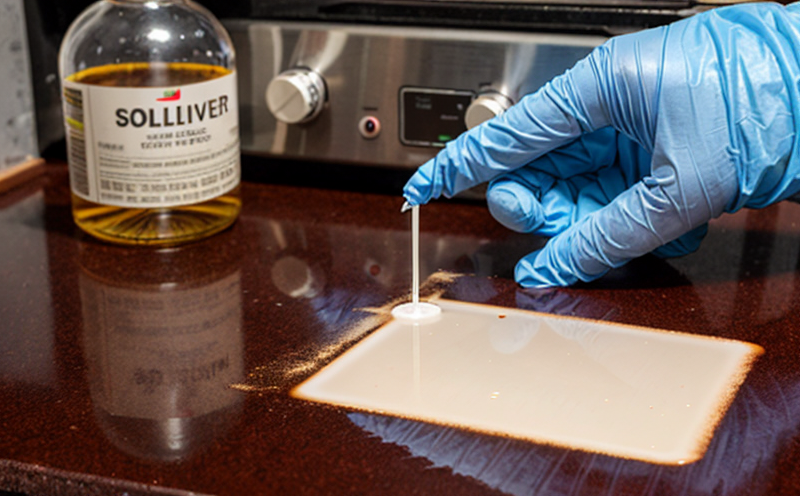Hydraulic Fluid Solvent Residue Testing
The testing of hydraulic fluid solvent residues is crucial in industries that rely on hydraulic systems. These systems are found in a wide range of sectors including aerospace, automotive manufacturing, construction equipment, and energy production. Ensuring the purity and performance of hydraulic fluids is paramount to prevent system failures and extend component life.
Hydraulic fluids can be contaminated by various solvents during their production or use. Solvent residues may come from the base oil refining process, additive formulation, or even operational wear and tear. Residues left in the fluid can lead to issues such as reduced lubricity, increased wear rates, and potential chemical breakdowns within the hydraulic system.
Our service focuses on identifying and quantifying these solvent residues using advanced analytical techniques that meet international standards like ISO 16232:2015. This standard provides a standardized method for determining the total acid number in lubricating oils which, when applied correctly, can also be used to assess solvent residues.
For this service, we start with rigorous sample preparation ensuring no contamination from external sources. The fluid samples are analyzed using gas chromatography coupled with mass spectrometry (GC-MS), a method capable of detecting even trace amounts of solvents down to parts per million levels. This level of precision is essential for maintaining the integrity and performance of hydraulic systems.
The results we provide include detailed reports specifying which solvents are present along with their concentrations. These findings help our clients make informed decisions about fluid maintenance, replacement strategies, and potential contamination sources. Our service not only ensures regulatory compliance but also enhances operational efficiency by minimizing unscheduled downtime due to system failures caused by solvent residue build-up.
Our approach is tailored to meet the specific needs of different industries within this sector. For instance, in aerospace applications where hydraulic systems operate under extreme conditions, even small amounts of residual solvents can have significant impacts on performance and safety. We employ specialized techniques that are particularly adept at handling such challenging samples.
In summary, our Hydraulic Fluid Solvent Residue Testing service offers a comprehensive solution for maintaining the quality and reliability of hydraulic fluids across various sectors. By leveraging cutting-edge technology and adhering strictly to international standards, we ensure accurate and actionable results that contribute directly to improved operational efficiency and extended equipment lifespan.
Benefits
Prevents equipment failure due to reduced lubricity and increased wear rates caused by solvent residues.
Achieves optimal performance through precise monitoring of fluid quality, ensuring that the hydraulic system operates efficiently under all conditions.
Reduces maintenance costs associated with premature equipment failures by identifying potential issues early on.
Maintains regulatory compliance which is essential for avoiding costly fines and legal issues related to non-compliance.
Customer Impact and Satisfaction
Our clients benefit significantly from our Hydraulic Fluid Solvent Residue Testing service. By providing accurate, reliable data on the presence and concentration of solvent residues in their hydraulic fluids, we enable them to make informed decisions regarding fluid maintenance, replacement strategies, and contamination control.
The insights gained from this testing contribute directly to improved operational efficiency and extended equipment lifespan. Our comprehensive approach ensures that our clients stay ahead of potential issues, thereby enhancing overall customer satisfaction and loyalty.
Competitive Advantage and Market Impact
In a competitive market, maintaining the highest standards of quality and reliability is crucial for success. By offering Hydraulic Fluid Solvent Residue Testing services that exceed industry expectations, we give our clients a distinct advantage over competitors who may not offer such stringent testing protocols.
This service enhances brand reputation by demonstrating commitment to excellence in product performance and safety. It also helps our clients secure long-term contracts with key partners and customers who value quality assurance above all else.





